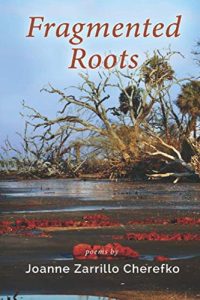Why not Bleeding Letters and Fragmented Roots?
I based the title of my second book of poetry on a line from the poem, “The Uncoupling,” but the concept of fragmented roots permeates the other poems in the book. First, here’s the poem itself:
 The Uncoupling
The Uncoupling
As I lie or lay recumbent
Having laid the word dying to rest,
I murmur apologies
To bleeding letters
And fragmented roots,
Having viewed the intimate
Coupling of words
Which I subsequently
Set asunder
With my pen.
I did not title my book Bleeding Letters and Fragmented Roots, (even though that was my first desire) because my friends and I thought it was a bit over the top. It reminded me of all of the books I have read about serial killers. But, I digress!
In this poem, I was trying to convey the frustration every poet feels when attempting to create the absolute best combination and flow of words, imagery, and rhythm. The idea of fragmented roots, however, is a thread that runs throughout the collection. I grew up in a dysfunctional home in which my parents would finally separate (but not until after constant turmoil that became the root of my anxiety, which would follow me to this day). When my mother died suddenly the year after my father left, my roots were not just fragmented; they were obliterated. Later, there were many romantic relationships that became fragmented and some friendships that became fragmented over the years.
Further, I used fragments from some older poems and combined them with new stanzas to form a completely new poem. None of my readers have told me that these poems feel “fragmented,” but even if anyone thinks any poem is slightly fragmented, I will refer them to my muse and icon, T.S. Eliot. He often combined single poems with other verse in order to create an entirely new poem. “Hollow Men,” one of my favorite poems, evolved in the following manner:
• Part 1: originally published in the winter of 1924
• Part III: published as the 3rd part of ‘Doris’s Dream Songs” in November, 1924
• Parts 1, 11, and IV: published together for the first time in March, 1925
• The whole poem, with the final addition (Part V) appeared in late 1925
Sadly, Fragmented Roots was released during the U.S. coronavirus pandemic of 2020. No parties, no autographs, no in-person celebrations. What to do? What to do? If the muse returns to my house (and she mysteriously went missing last September), I will begin writing about this bizarre state of affairs and release a third book of poetry when I am actually allowed to re-enter society. What shall I name it? Who knows? But one thing is certain – the title will originate from one of the yet-to-be-written poems in the collection.

Recent Comments